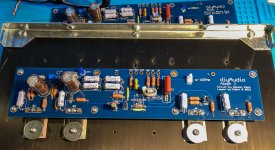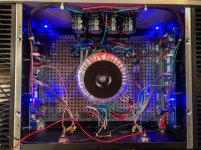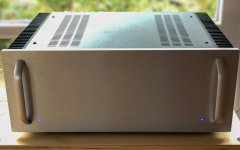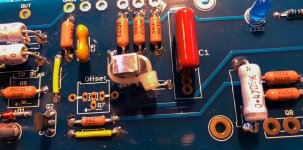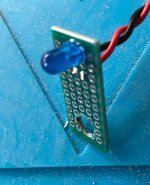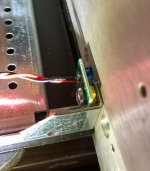OK, I added them to my order from Mouser. I'm probably no the best trail blazer for this, I doubt I would ever hear the difference. Even if I were to unsolder and then solder in different C1's, by the time I did all that and started listening to music...
Like I said, probably not the best trailblazer, however, I'll be sure to report back and wax poetically on how wonderful the sound is with this type of capacitor.
I haven't touched a soldering iron in three months, wife and I moved to a new home in a new state. Tired of emptying boxes and hanging pictures, with winter here, this is prime DIY time.
Like I said, probably not the best trailblazer, however, I'll be sure to report back and wax poetically on how wonderful the sound is with this type of capacitor.
I haven't touched a soldering iron in three months, wife and I moved to a new home in a new state. Tired of emptying boxes and hanging pictures, with winter here, this is prime DIY time.
Just starting on this project as well.
It is advisable to *match* the 8 MOFSETs that diy store is currently out of?
8 - IRFP240 N Channel MOSFETs
Aleph J Transistor Kit – diyAudio Store
Thanks
It is advisable to *match* the 8 MOFSETs that diy store is currently out of?
8 - IRFP240 N Channel MOSFETs
Aleph J Transistor Kit – diyAudio Store
Thanks
You will be able to notice the difference between different type of capacitors... it will be quite obvious.
WIMA MKP10's are pretty good and cheap; probably the best value of them all.
The final choice will depend on the rest of your system and your personal preferences, but be warned.... you may start spending large amounts of money on exotic types...
WIMA MKP10's are pretty good and cheap; probably the best value of them all.
The final choice will depend on the rest of your system and your personal preferences, but be warned.... you may start spending large amounts of money on exotic types...
@Tuberoller -
Theres a lot of great information in this thread. If you're new to the Aleph J circuit, I strongly recommend reading it from end to end. You'll know what's critical and what to skip.
I'll get you started here.
Post #1803
Theres a lot of great information in this thread. If you're new to the Aleph J circuit, I strongly recommend reading it from end to end. You'll know what's critical and what to skip.
I'll get you started here.
Post #1803
You will be able to notice the difference between different type of capacitors... it will be quite obvious.
I have not found that to be true, within modern available polypropylene capacitors - good caps from the first tier manufacturers have become so incredibly good in the last few years that there's no real difference between WIMA, Kemet, Vishay, Panasonic, etc... they are all great! I've built a lot of phono stages, where it's critical to have good caps in the RIAA equalizer and I've been happy with all of them.
Nice effort on the jfets, wan't to tell us more?
If it was mine I would reflow some solder joints on the OT, Q6 looks the "worst" of all.
Nice job!
If it was mine I would reflow some solder joints on the OT, Q6 looks the "worst" of all.
Nice job!
This is a thread about the AJ, not capacitors, I probably shouldn't of even brought it up...sorry
I have not found that to be true, within modern available polypropylene capacitors - good caps from the first tier manufacturers have become so incredibly good in the last few years that there's no real difference between WIMA, Kemet, Vishay, Panasonic, etc... they are all great! I've built a lot of phono stages, where it's critical to have good caps in the RIAA equalizer and I've been happy with all of them.
I was thinking more of comparing the WIMA, Kemet, Vishay, Panasonic, etc... run-of-the-mill polypropylene metalized films to something like the latest incarnation of AuriCap XO's. I personally like AuriCaps! Better than Mundorf silver-in-oil, again - in my opinion.
Pass DIY Addict
Joined 2000
Paid Member
Genechow: nice work! Now sit back and enjoy! It's time to swap in my Aleph-J since the weather is getting colder again. Been listening to the MoFo amps during the summer months.
what is run of the mill polypropylenes? many caps are made in china, then branded by big cap companies...
@Tuberoller -
Theres a lot of great information in this thread. If you're new to the Aleph J circuit, I strongly recommend reading it from end to end. You'll know what's critical and what to skip.
I'll get you started here.
Post #1803
Great Advice for anyone considering a diy project. I have read every build guide before even starting the project, usually while waiting for parts to come in and it has certainly been beneficial. It can be a lot of reading, but, it’ll answer pretty much every question you may come up with, give you ideas you may like to try out and may not have considered, and you’ll learn about that circuit and amp as you go along. And never fear, as 6L6 reiterated again at BAF 2019 there is a great bunch of people on this site to help with any brain cramps along the way and support.
Last edited:
Thanksgiving present to myself.
Thanks to Nelson Pass and everyone else involved.
Well done! Enjoy!
Nice effort on the jfets, wan't to tell us more?
If it was mine I would reflow some solder joints on the OT, Q6 looks the "worst" of all.
Nice job!
Thanks!
I realized after I soldered in the JFETs that post #1042 suggested thermal coupling the two JFETs. I was considering desoldering and moving them but the legs were already cut off and I didn't have much to work with. Instead, I milled some aluminum in a T profile so that it fit between the two JFETs with thermal paste and then zip-tied them together.
Attachments
Nice work, impressive.
How did you do the front panel leds because you nailed
Thanks!
I drilled small (2 mm?) holes through the front panel and then countersunk them from the back to 5 mm to fit the LEDs. I mounted the LEds on perf board and then drilled holes the correct distance from the chassis screw and mounted them with a longer chassis screw and spacer. Sorry for the out-of-focus photo.
Attachments
- Home
- Amplifiers
- Pass Labs
- Aleph J illustrated build guide
